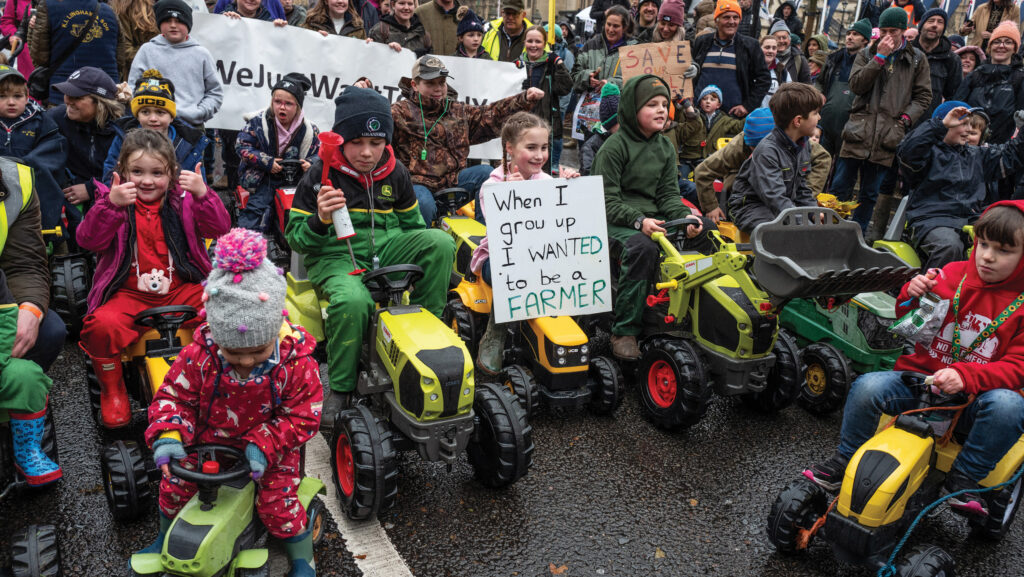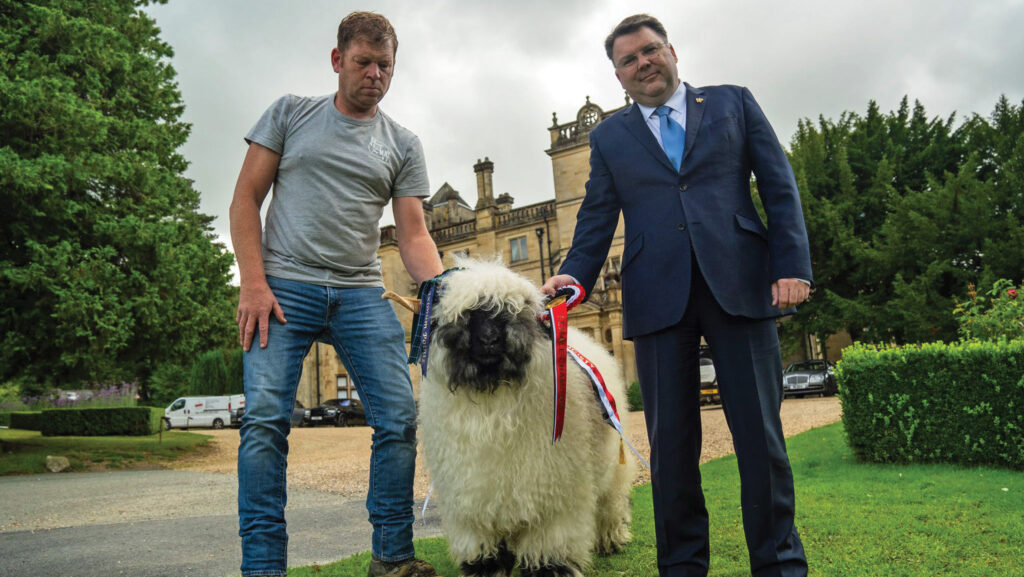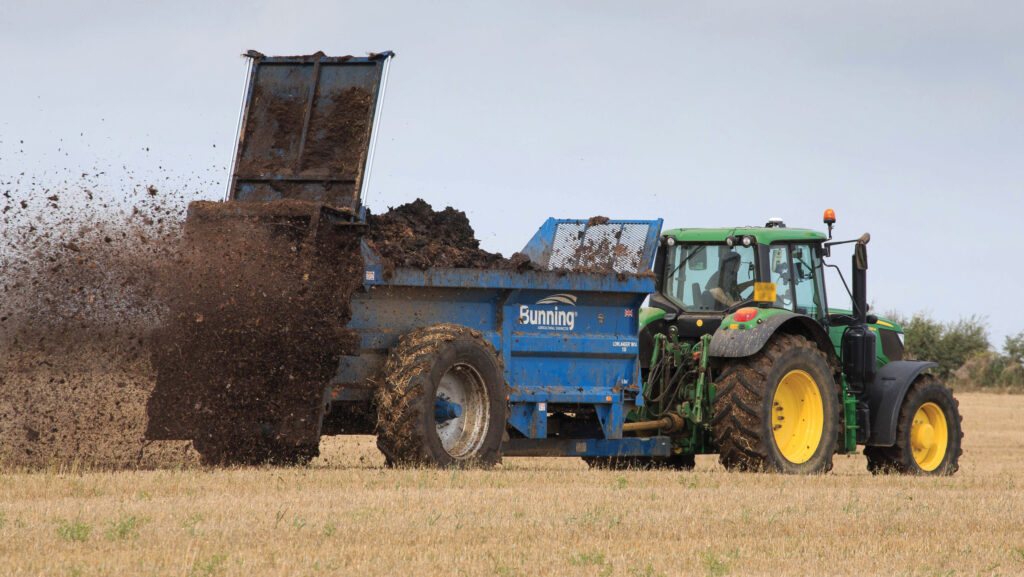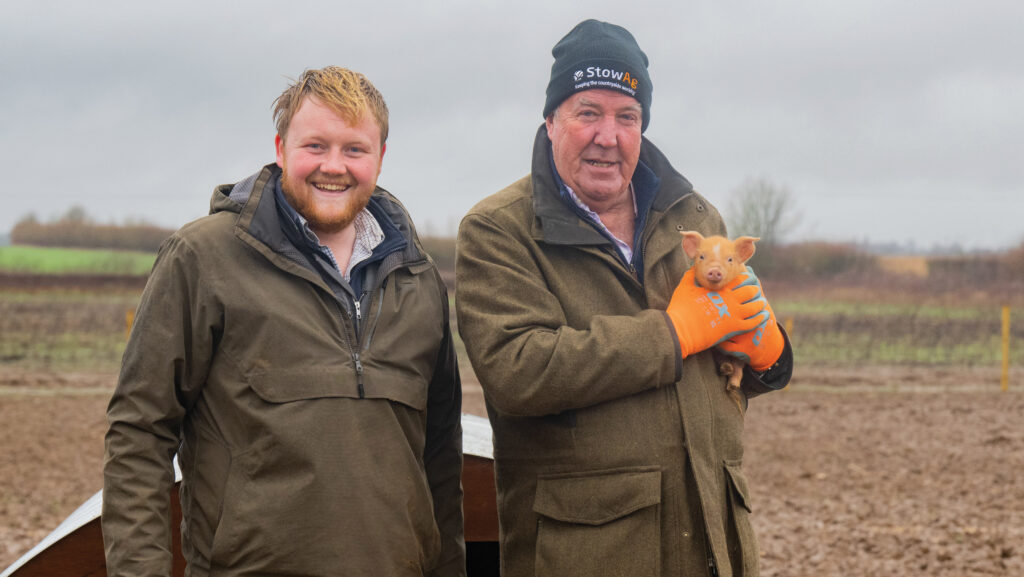Review of the Year 2024: From legal challenges to London demos
 © Phil Weedon
© Phil Weedon From celebrations to commiserations – Farmers Weekly takes you through the A-Z of this year’s agricultural highs and lows. In this article, we look at H-M…
See also: Farmers in London to protest ‘family farm tax raid’
H is for “How much?”

Valais Blacknose sheep with farm manager Mark Tustain (left) and Palé Hall Hotel director Calum Milne © Palé Hall Hotel
It has been a year of extremes in the markets with beef and sheep soaring to record levels, and cereals and oilseeds stuck in the doldrums.
Amid tight supplies, deadweight cattle prices have been on an upward trajectory, with R4L steers passing the 500p/kg mark in mid-August and pushing on to clear 540p/kg by December.
The lamb trade has also tracked ahead of last year, with R3L animals now topping 650p/kg deadweight.
Young animals, stores, culls and show beasts have all mirrored this trend.
Speciality breeds have been in demand too, as demonstrated by the owners of the five-star Palé Hall Hotel in mid-Wales, who coughed up almost £100,000 for five rare breed Valais Blacknose sheep.
Grain markets, in contrast, have failed to excite.
Despite a significantly smaller UK crop courtesy of the weather, ex-farm feed wheat has been “range bound” between £170/t and £190/t for much of the year, held back by global markets.
It’s been depressing news for farm incomes too.
Figures released by Defra in November revealed a 56% fall across the board in 2023-24, with cereal growers, mixed farms and dairy leading the way.
I is for “Incoming”
The Labour government’s decision to reduce the number of Seasonal Worker visas for 2025 triggered dismay among soft fruit and vegetable growers.
While the previous Conservative government had committed to a cap of 45,000 visas each year until 2029, only 43,000 visas will be allocated for horticulture next year, with an additional 2,000 for the poultry sector.
Defra farming minister Daniel Zeichner said this would give farmers “certainty” to plan ahead.
British Growers Association chief executive Jack Ward was less impressed, noting that the reduction comes despite a growing need for labour in the horticulture sector.
As well as worker shortages, the sector is struggling with workforce shortages, increased employer costs and grower anxiety about long-term plans under the new Labour government.
The NFU sought an extension of visa durations, from six to nine months, to help manage longer harvest seasons – with some sectors requiring up to 12 weeks to train new workers.
The government said “no”, adding that only 34,755 visas were claimed in 2024 anyway.
J is for “Judicial review”

Muckspreading in autumn was scrutinised at the High Court © Tim Scrivener
It has been a busy year in the courts, especially for environmental group River Action.
It mounted a legal challenge against the Environment Agency for allowing muckspreading in the autumn, which, it said, was contrary to the Farming Rules for Water.
The case was considered in the High Court in May and, while the judge concluded that the EA had done nothing wrong, he did indicate his belief that Defra’s guidance should be amended to limit muckspreading – something Defra is currently working on.
In another case, River Action and its solicitors Leigh Day started gathering evidence from rural businesses that may have lost earnings as a result of pollution in the River Wye, in the hope of winning compensation from poultry processor Avara Foods.
The process is ongoing.
In July, campaign group Fighting Dirty lost a judicial review in the High Court against the Environment Agency, which it was calling on to stop the spreading of sewage sludge on farmland.
Conservation group Wild Justice is hoping for more success.
With solicitors Leigh Day, it has started a court case against the Dartmoor Commoners’ Council in an attempt to force livestock farmers to reduce stocking rates on the moor.
K is for “Kaleb”

Kaleb Cooper (left) and Jeremy Clarkson © Freuds
Kaleb Cooper – the surprise star of Clarkson’s Farm – made the most of his spell in the spotlight with a stage show, a third series of the popular TV show, and another book.
In an interview with Farmers Weekly, Kaleb said the stage show had been “well outside my comfort zone”, but emphasised the importance of talking as a way of improving mental health.
He also admitted to walking round the house with one sock on and one sock off.
“It’s like sitting in the tractor with both the air con and the heated seat on at the same time,” he said.
Season 3 of Clarkson’s Farm ran on Amazon Prime TV in May to critical acclaim from farmers.
Season 4 is due to air in the spring of 2025.
L is for “Last straw”

Farming families descended on Westminster to protest against inheritance tax changes © Phil Weedon
The NFU condemned the Labour government’s proposed inheritance tax on farms worth over £1m, calling it the “last straw” for an already struggling industry.
NFU president Tom Bradshaw warned the “family farm tax”, which was outlined in the October Budget and is being imposed on farms from April 2026, could force many farming families to sell land to cover their costs.
“That is the straw which broke the camel’s back,” Mr Bradshaw told an NFU’s mass lobby event in London on 19 November, accusing the government of an “extraordinary” betrayal.
The budget introduced further punitive measures, including accelerated delinked payment reductions for English farmers, increased employer costs, higher double-cab pickup taxes and taxes on fertilisers.
Fed up with the direction of travel, thousands of farmers descended on London for a mass rally in Westminster, and there have been further demonstrations in the capital, as well as in other towns and cities around the UK.
Welsh farmers blockaded the port of Holyhead, Scots farmers marched on Holyrood, Northern Irish farmers targeted Stormont, and English farmers staged tractor protests in Dover, Melton Mowbray, York and other provincial towns and cities.
M is for “Midge attack”
Bluetongue disease made its unwelcome return to UK shores, as the BTV-3 virus hitched a ride on a plume of midges winging their way across the Channel to Norfolk in August.
Experts warned the situation would get worse before it got better – and they were right.
Within a week or two, bluetongue was found on 34 farms in the East.
And as the disease gained momentum, surging to the North, so did new restriction zones.
Emergency vaccination was introduced, but not widely taken up.
The English Winter Fair was one of the casualties – it was cancelled to protect exhibitor livestock and farmers’ livelihoods.
In another blow to livestock farmers, abattoir operators cut lamb prices by up to 50p/kg in restriction zones, blaming additional costs.
